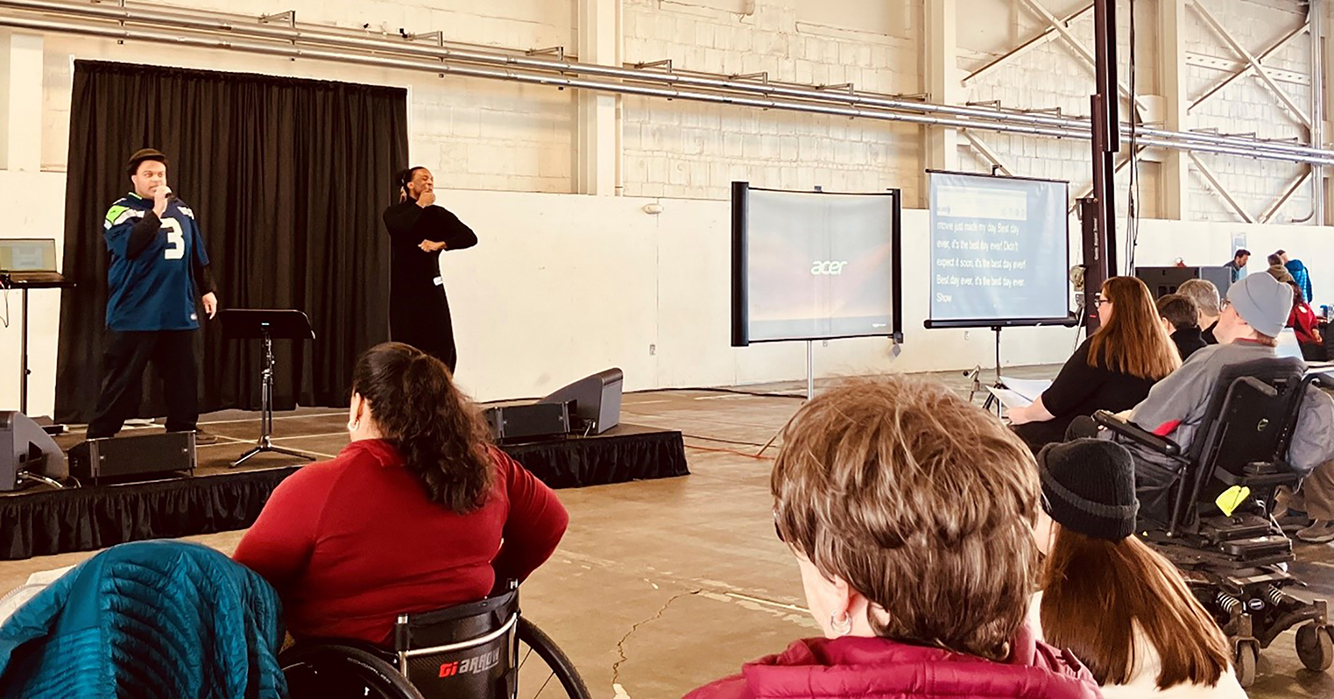Celebrating Inclusion in Community

On January 20, 2024, the community came together to celebrate 50 years of the Rehabilitation Act at Magnuson Park’s Hanger 30. The Rehabilitation Act of 1973, as amended (commonly called the Rehab Act), prohibits discrimination based on disability in programs conducted by federal agencies, receiving federal financial aid, federal employment, and employment practices of federal contractors. Sections 503 and 504 of the Rehab Act are well known in education settings for supporting students with disabilities. Additionally, there are broad applications of the Rehab Act for labor standards programs that receive federal funding.

Staff from The Taskar Center for Accessible Technology provided an opportunity for community members to plan pathways through Seattle using AccessMap.app.
Several staff members from The Taskar Center for Accessible Technology at the University of Washington attended the event. The Center “harnesses the power of open-source technology to develop, translate, and deploy accessible technologies, and then sustain them in the hands of communities.” The Center’s work focuses on developing tools for populations with motor limitations or speech impairment, which emphasis on mobility.
In December 2021, the Taskar Center released AccessMap, an open-source mobile app that provides detailed information about pedestrian pathways and transit stations, and displays elevation changes, curb ramps, and publicly accessible elevators. Users can specify information about their own mobility and trip preferences, and the automated routing service presents the best route for the profile.

Find a Ride, a program stewarded by the King County Mobility Coalition, Hopelink, and other partners, was featured on the table of UW’s Taskar Center for Accessible Technology.
Hopelink Mobility Management staff invited participants at the event to serve as community testers for a new Find a Ride trip planner, which is in development in partnership with King County Mobility Coalition. The program focuses on the transportation and access needs of older adults and people with disabilities. Hopelink’s trip planner works towards Web Content Accessibility Guidelines (WCAG) and Rehab Act Section 508 conformances.
Find a Ride includes nearly two dozen specialized transportation services for Pierce, King, and Snohomish counties that have never been coordinated in a trip planner. Read the Hopelink roadmap and business plan to learn more.
To use the online Find a Ride application, click here. Click on Test Our Trip Planner at the top of the Find a Ride page if you would like to volunteer as a community tester. Public feedback will help create a unified program to deliver accessible trip-planning experiences. For more information, call 425-943-6760 and press 3.
50 Years of the Rehabilitation Act

Age Friendly Seattle staff promoted upcoming events, including upcoming Civic Coffees.
The Rehab Act 50th anniversary celebration featured keynote speaker Dr. Anjali J. Forber- Pratt, Activist, Paralympic Medalist, Director of the National Institute of Disability, and Independent Living and Rehabilitation Research.
Also included was a performance by Fantasy A, a lecture on the history of Section 504 of the Rehabilitation Act by Sushil Oswal, PhD, University of Washington, and ASL Story Telling by Loni Friedman.
The event was organized by the City of Seattle, Age Friendly Seattle, Associated Recreation Council, National Federal of the Blind Washington, Northwest ADA Center, The Seattle Public Library, Studio Pacifica, and University of Washington.
 Contributor Laura Loe is the Find a Ride program manager at Hopelink.
Contributor Laura Loe is the Find a Ride program manager at Hopelink.
Photo at top: The event included an uplifting performance from Fantasy A (Alex Hubbard), with ASL translation and CART (Communication Access Realtime Translation) services support.
This article appeared in the March 2024 issue of AgeWise King County.
![Aging & Disability Services for Seattle & King County [logo]](https://www.agingkingcounty.org/wp-content/themes/sads/images/seattle-ads-logo.png)